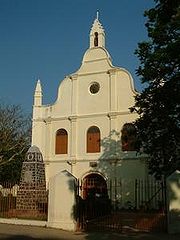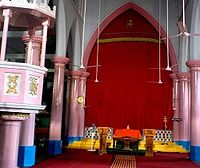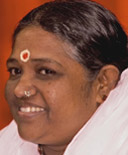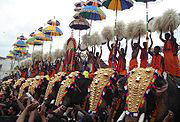Kerala is unique in India for its diverse mix of religions. According to Census of India figures, 56% of Kerala residents are Hindus, 24% are Muslims, 19% are Christians, and the remaining 1% follow other religions including Sikhism, Jainism, Buddhism, Judaism. Hindus basically consists of castes such as the Ezhavas, Nairs, Dalits and Kerala Brahmins.
 The Abrahamic religions attest to Kerala's prominence as a major trade center. Judaism arrived in Kerala with spice traders, possibly as early as the 7th century BC. A significant Jewish community existed in Kerala until the 20th century when most emigrated to Israel leaving only a handful of families. In AD 52, Christianity reached the shores of Kerala with the arrival of St. Thomas, one of the Twelve Apostles of Jesus Christ. The major Christian denominations are Syrian Catholic, Latin Catholic, Malankara Catholic, Jacobite, Malankara Orthodox, CSI (Church of South India), Marthoma and Pentecostal Churches. The general consensus among historians is that Islam arrived in Kerala through Arab traders either during the time of Prophet Muhammad himself (AD 609 - AD 632) or in the following few decades. In the 7th Century, the Zamorine of Kozhikode allowed these traders to settle and form a major community in Kozhikode, from where the religion gradually spread in the following centuries. Jainism, which arrived in Kerala around the 3rd century BC, has a considerable population of in the Wayanad district bordering the Karnataka state. The Abrahamic religions attest to Kerala's prominence as a major trade center. Judaism arrived in Kerala with spice traders, possibly as early as the 7th century BC. A significant Jewish community existed in Kerala until the 20th century when most emigrated to Israel leaving only a handful of families. In AD 52, Christianity reached the shores of Kerala with the arrival of St. Thomas, one of the Twelve Apostles of Jesus Christ. The major Christian denominations are Syrian Catholic, Latin Catholic, Malankara Catholic, Jacobite, Malankara Orthodox, CSI (Church of South India), Marthoma and Pentecostal Churches. The general consensus among historians is that Islam arrived in Kerala through Arab traders either during the time of Prophet Muhammad himself (AD 609 - AD 632) or in the following few decades. In the 7th Century, the Zamorine of Kozhikode allowed these traders to settle and form a major community in Kozhikode, from where the religion gradually spread in the following centuries. Jainism, which arrived in Kerala around the 3rd century BC, has a considerable population of in the Wayanad district bordering the Karnataka state.
 The Judeo-Nasrani tradition of the Syro-Malabar Nasranis was wiped out when the Portuguese invaded Kerala, and denounced the Nasrani account of Christian faith as false. They imposed their European rituals and liturgy and obliterated the Jewish legacy from the Nasrani tradition. The Portuguese described the Nasranis as Sabbath-keeping Judaizers. Archbishop Menezes of Goa, convened the Synod of Diamper in Kerala in 1599. There he ordered all the texts of the Syrian Nasranis to be burnt. The Portuguese burned the Gospel of Thomas and the Acts of Thomas. The purpose stated by Menezes was to erase all legacies of antiquity and Jewishness. Amongst several accusations, the Nasranis were accused of not venerating images of saints and biblical figures. They completely obliterated the records of early Nasrani life and Hebrew-Syriac tradition and imposed on the Nasranis that they were local people who were converted and not descendants of early Jewish settlers converted to Christianity by the Apostle Thomas. This despite the fact that the Acts of Thomas (a copy of which still survives in a monastery on Mount Sinai), states that the early Christian converts by the apostle Thomas in Kerala were early Jewish people settled in the Malabar coast. The Judeo-Nasrani tradition of the Syro-Malabar Nasranis was wiped out when the Portuguese invaded Kerala, and denounced the Nasrani account of Christian faith as false. They imposed their European rituals and liturgy and obliterated the Jewish legacy from the Nasrani tradition. The Portuguese described the Nasranis as Sabbath-keeping Judaizers. Archbishop Menezes of Goa, convened the Synod of Diamper in Kerala in 1599. There he ordered all the texts of the Syrian Nasranis to be burnt. The Portuguese burned the Gospel of Thomas and the Acts of Thomas. The purpose stated by Menezes was to erase all legacies of antiquity and Jewishness. Amongst several accusations, the Nasranis were accused of not venerating images of saints and biblical figures. They completely obliterated the records of early Nasrani life and Hebrew-Syriac tradition and imposed on the Nasranis that they were local people who were converted and not descendants of early Jewish settlers converted to Christianity by the Apostle Thomas. This despite the fact that the Acts of Thomas (a copy of which still survives in a monastery on Mount Sinai), states that the early Christian converts by the apostle Thomas in Kerala were early Jewish people settled in the Malabar coast.
Each of these religions have left a mark on Kerala with major sites of worship that draw numerous pilgrims.  The major Hindu pilgrimage centers are located in Guruvayur, Sabarimala, Ettumanoor, and Chottanikkara. Christians have prominent churches and shrines in Malayattoor, Arthungal, Bharananganam, Kuravilangad, Parumala, Manarcaud, Vallarpadam, Edathua, and Edapally. One famous Muslim mosque is located at Ponnani. Kerala Jews centered in the city of Kochi have the Cochin Synagogue, the oldest synagogue in India. Notably, Kerala's various religious communities have lived together in relative peace and amicability.
Kerala is home to Hindu saints and swamis of all castes. Vaikunda Swami, who was the first among the saints of Kerala. Adi Shankara , Chattampi swamikal, Swami Chinmayanada, Sant Enadinatha, Sant Ilakkulaccanrar, Sant Tiruppana , Cheraman Nayanar,Sree Narayana Guru were well known saints. The Harijan Parayas of Kerala claim to descend from Sant Vasistha.Kollengode has a structure near Thirthala-Koottanad Road, in memory of a Harijan saint, Sant Paakkanar.In the Rapayan Tujjal, the narrator (dancer-reciter) is a Harijan and a descendant of Sant Pakkanar.The Periya Puranam, possibly written by a Paraya, describes the Parayas. Further, the Vishvakarma Purana was written by a sonar (goldsmith), Mata Amritanandamayi. The major Hindu pilgrimage centers are located in Guruvayur, Sabarimala, Ettumanoor, and Chottanikkara. Christians have prominent churches and shrines in Malayattoor, Arthungal, Bharananganam, Kuravilangad, Parumala, Manarcaud, Vallarpadam, Edathua, and Edapally. One famous Muslim mosque is located at Ponnani. Kerala Jews centered in the city of Kochi have the Cochin Synagogue, the oldest synagogue in India. Notably, Kerala's various religious communities have lived together in relative peace and amicability.
Kerala is home to Hindu saints and swamis of all castes. Vaikunda Swami, who was the first among the saints of Kerala. Adi Shankara , Chattampi swamikal, Swami Chinmayanada, Sant Enadinatha, Sant Ilakkulaccanrar, Sant Tiruppana , Cheraman Nayanar,Sree Narayana Guru were well known saints. The Harijan Parayas of Kerala claim to descend from Sant Vasistha.Kollengode has a structure near Thirthala-Koottanad Road, in memory of a Harijan saint, Sant Paakkanar.In the Rapayan Tujjal, the narrator (dancer-reciter) is a Harijan and a descendant of Sant Pakkanar.The Periya Puranam, possibly written by a Paraya, describes the Parayas. Further, the Vishvakarma Purana was written by a sonar (goldsmith), Mata Amritanandamayi.
The official festivals of Sree Narayana Jayanti (Narayana Guru's birthday) and Sree Narayana Samadhi Day (Narayana Gurus passing away) are celebrated by the Keralites in memory of a great Shudra reformer of their society. The modern Hindu Karma yogi saint Amma (Mata Amritanandamayi) is was from the Arayan caste (fisherman). She was selected to represent Hindu Dharma in the World Parliament of Religions in September 1991. Bhagawan Nityananda is another important Hindu saint reognized worldwide. Several Hindu movements important to Hindu history took place in Kerala. These were Shankara's Advaita, Vaishnava Alwar, and Shaiva Nayanar. Kerala has several ancient Hindu temples. In the medieval Alwar Divya Desam text, out of 108 Vaishnava temples all over India adored by the Alwars, eleven of those are in Kerala.The Karppillikkavu Sree Mahadeva Temple, (one of the most ancient in India) dedicated to the Kirata avatar of Lord Shiva still exists in Kerala. |
 The Abrahamic religions attest to Kerala's prominence as a major trade center. Judaism arrived in Kerala with spice traders, possibly as early as the 7th century BC. A significant Jewish community existed in Kerala until the 20th century when most emigrated to Israel leaving only a handful of families. In AD 52, Christianity reached the shores of Kerala with the arrival of St. Thomas, one of the Twelve Apostles of Jesus Christ. The major Christian denominations are Syrian Catholic, Latin Catholic, Malankara Catholic, Jacobite, Malankara Orthodox, CSI (Church of South India), Marthoma and Pentecostal Churches. The general consensus among historians is that Islam arrived in Kerala through Arab traders either during the time of Prophet Muhammad himself (AD 609 - AD 632) or in the following few decades. In the 7th Century, the Zamorine of Kozhikode allowed these traders to settle and form a major community in Kozhikode, from where the religion gradually spread in the following centuries. Jainism, which arrived in Kerala around the 3rd century BC, has a considerable population of in the Wayanad district bordering the Karnataka state.
The Abrahamic religions attest to Kerala's prominence as a major trade center. Judaism arrived in Kerala with spice traders, possibly as early as the 7th century BC. A significant Jewish community existed in Kerala until the 20th century when most emigrated to Israel leaving only a handful of families. In AD 52, Christianity reached the shores of Kerala with the arrival of St. Thomas, one of the Twelve Apostles of Jesus Christ. The major Christian denominations are Syrian Catholic, Latin Catholic, Malankara Catholic, Jacobite, Malankara Orthodox, CSI (Church of South India), Marthoma and Pentecostal Churches. The general consensus among historians is that Islam arrived in Kerala through Arab traders either during the time of Prophet Muhammad himself (AD 609 - AD 632) or in the following few decades. In the 7th Century, the Zamorine of Kozhikode allowed these traders to settle and form a major community in Kozhikode, from where the religion gradually spread in the following centuries. Jainism, which arrived in Kerala around the 3rd century BC, has a considerable population of in the Wayanad district bordering the Karnataka state. The Judeo-Nasrani tradition of the Syro-Malabar Nasranis was wiped out when the Portuguese invaded Kerala, and denounced the Nasrani account of Christian faith as false. They imposed their European rituals and liturgy and obliterated the Jewish legacy from the Nasrani tradition. The Portuguese described the Nasranis as Sabbath-keeping Judaizers. Archbishop Menezes of Goa, convened the Synod of Diamper in Kerala in 1599. There he ordered all the texts of the Syrian Nasranis to be burnt. The Portuguese burned the Gospel of Thomas and the Acts of Thomas. The purpose stated by Menezes was to erase all legacies of antiquity and Jewishness. Amongst several accusations, the Nasranis were accused of not venerating images of saints and biblical figures. They completely obliterated the records of early Nasrani life and Hebrew-Syriac tradition and imposed on the Nasranis that they were local people who were converted and not descendants of early Jewish settlers converted to Christianity by the Apostle Thomas. This despite the fact that the Acts of Thomas (a copy of which still survives in a monastery on Mount Sinai), states that the early Christian converts by the apostle Thomas in Kerala were early Jewish people settled in the Malabar coast.
The Judeo-Nasrani tradition of the Syro-Malabar Nasranis was wiped out when the Portuguese invaded Kerala, and denounced the Nasrani account of Christian faith as false. They imposed their European rituals and liturgy and obliterated the Jewish legacy from the Nasrani tradition. The Portuguese described the Nasranis as Sabbath-keeping Judaizers. Archbishop Menezes of Goa, convened the Synod of Diamper in Kerala in 1599. There he ordered all the texts of the Syrian Nasranis to be burnt. The Portuguese burned the Gospel of Thomas and the Acts of Thomas. The purpose stated by Menezes was to erase all legacies of antiquity and Jewishness. Amongst several accusations, the Nasranis were accused of not venerating images of saints and biblical figures. They completely obliterated the records of early Nasrani life and Hebrew-Syriac tradition and imposed on the Nasranis that they were local people who were converted and not descendants of early Jewish settlers converted to Christianity by the Apostle Thomas. This despite the fact that the Acts of Thomas (a copy of which still survives in a monastery on Mount Sinai), states that the early Christian converts by the apostle Thomas in Kerala were early Jewish people settled in the Malabar coast. The major Hindu pilgrimage centers are located in Guruvayur, Sabarimala, Ettumanoor, and Chottanikkara. Christians have prominent churches and shrines in Malayattoor, Arthungal, Bharananganam, Kuravilangad, Parumala, Manarcaud, Vallarpadam, Edathua, and Edapally. One famous Muslim mosque is located at Ponnani. Kerala Jews centered in the city of Kochi have the Cochin Synagogue, the oldest synagogue in India. Notably, Kerala's various religious communities have lived together in relative peace and amicability.
Kerala is home to Hindu saints and swamis of all castes. Vaikunda Swami, who was the first among the saints of Kerala. Adi Shankara , Chattampi swamikal, Swami Chinmayanada, Sant Enadinatha, Sant Ilakkulaccanrar, Sant Tiruppana , Cheraman Nayanar,Sree Narayana Guru were well known saints. The Harijan Parayas of Kerala claim to descend from Sant Vasistha.Kollengode has a structure near Thirthala-Koottanad Road, in memory of a Harijan saint, Sant Paakkanar.In the Rapayan Tujjal, the narrator (dancer-reciter) is a Harijan and a descendant of Sant Pakkanar.The Periya Puranam, possibly written by a Paraya, describes the Parayas. Further, the Vishvakarma Purana was written by a sonar (goldsmith), Mata Amritanandamayi.
The major Hindu pilgrimage centers are located in Guruvayur, Sabarimala, Ettumanoor, and Chottanikkara. Christians have prominent churches and shrines in Malayattoor, Arthungal, Bharananganam, Kuravilangad, Parumala, Manarcaud, Vallarpadam, Edathua, and Edapally. One famous Muslim mosque is located at Ponnani. Kerala Jews centered in the city of Kochi have the Cochin Synagogue, the oldest synagogue in India. Notably, Kerala's various religious communities have lived together in relative peace and amicability.
Kerala is home to Hindu saints and swamis of all castes. Vaikunda Swami, who was the first among the saints of Kerala. Adi Shankara , Chattampi swamikal, Swami Chinmayanada, Sant Enadinatha, Sant Ilakkulaccanrar, Sant Tiruppana , Cheraman Nayanar,Sree Narayana Guru were well known saints. The Harijan Parayas of Kerala claim to descend from Sant Vasistha.Kollengode has a structure near Thirthala-Koottanad Road, in memory of a Harijan saint, Sant Paakkanar.In the Rapayan Tujjal, the narrator (dancer-reciter) is a Harijan and a descendant of Sant Pakkanar.The Periya Puranam, possibly written by a Paraya, describes the Parayas. Further, the Vishvakarma Purana was written by a sonar (goldsmith), Mata Amritanandamayi.

